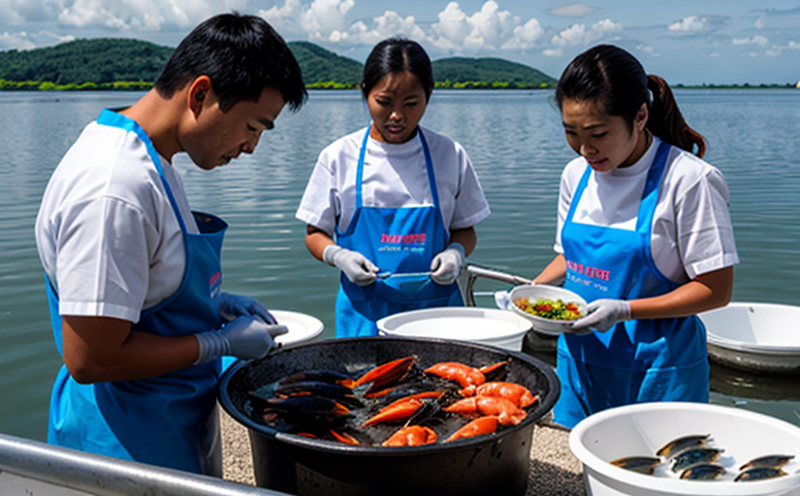ISO 5984 Ash Content Testing in Seafood Products
The ISO 5984 standard is a globally recognized method that provides detailed protocols for determining ash content in food products, including seafood. Ash content refers to the total amount of mineral matter remaining after a sample has been combusted at high temperatures, typically under an oxygen-rich environment like nitrogen or helium. This process eliminates organic materials and water, leaving only the inorganic compounds present.
In the context of seafood testing, ash content analysis is crucial for several reasons. First, it helps in identifying potential contaminants such as heavy metals (e.g., lead, cadmium) that may be introduced during processing or due to environmental factors. High levels of these elements can pose serious health risks and are regulated by various international standards.
The testing procedure involves precise sample preparation, where the seafood samples undergo thorough drying until constant weight is achieved. Then, they are weighed accurately before being combusted in a muffle furnace at 550°C for 3 hours. The resulting ash is collected, cooled, and weighed again to obtain the ash content percentage.
For quality assurance, this method ensures accurate measurement by using standard reference materials (SRMs) as per ISO 17025:2017. This helps in validating the precision and accuracy of the results, which are then reported back to clients along with detailed documentation.
The ash content testing is particularly important for ensuring compliance with international regulations set by organizations like the Food and Drug Administration (FDA), European Commission (EC), and Codex Alimentarius Commission. These bodies set limits on the permissible levels of heavy metals in seafood products, emphasizing the importance of accurate testing methods.
- Quality Assurance: Samples are analyzed using a combination of precision scales and high-temperature combustion ovens to ensure accuracy.
- Reliability: The method follows international standards such as ISO 5984 and ISO 17025, guaranteeing consistent results across different laboratories.
The process also involves rigorous sample preparation steps that include cleaning the samples thoroughly to remove any impurities. This step is critical in ensuring accurate ash content readings. The seafood products tested can range from fresh fish to frozen shrimp and processed sea cucumbers, making this method versatile for various food industries.
Understanding the scope of ISO 5984 testing is essential for quality managers and compliance officers who need to ensure that their products meet international standards. By adhering to these stringent protocols, companies can maintain a high level of product integrity and consumer trust. This service is particularly beneficial for R&D engineers working on new formulations or processing techniques, as it provides valuable insights into the composition of seafood ingredients.
In summary, ISO 5984 ash content testing in seafood products offers a robust framework for ensuring product safety and compliance with international standards. It plays a vital role in safeguarding public health by identifying potential contaminants and maintaining high-quality standards across the food industry.
Eurolab Advantages
EuroLab is committed to providing clients with comprehensive testing services that meet the highest standards of accuracy, precision, and reliability. Our team of experienced chemists specializes in seafood testing, ensuring that every sample analyzed adheres strictly to ISO 5984 protocols.
- Comprehensive Testing Services: EuroLab offers a wide range of food safety tests, including microbiological analysis and pesticide residue detection.
- Expertise and Experience: Our chemists have extensive experience in analyzing various types of seafood, ensuring accurate and reliable results.
- State-of-the-Art Equipment: We utilize advanced analytical instruments that comply with international standards to ensure precise measurements.
Our clients benefit from our commitment to quality and reliability. We offer flexible turnaround times to accommodate the needs of different industries, whether it's rapid testing for immediate compliance or in-depth analysis for long-term product development.
EuroLab’s focus on continuous improvement ensures that we stay at the forefront of food safety technology, providing services that meet current and future regulatory requirements. By choosing EuroLab, clients can trust that they are receiving unbiased, expert advice to help them achieve their goals in seafood testing.
Quality and Reliability Assurance
EuroLab’s commitment to quality and reliability is reflected in our adherence to international standards such as ISO 5984:1990 and ISO/IEC 17025:2017. Our robust quality management systems ensure that every test conducted meets the highest levels of accuracy and precision.
- ISO 5984 Compliance: We strictly follow the procedures outlined in ISO 5984, which specifies the ash content determination for food products.
- ISO/IEC 17025 Accreditation: Our laboratory is fully accredited to this standard, ensuring that our tests are conducted with the utmost precision and reliability.
To maintain these standards, we employ rigorous quality assurance measures. This includes regular calibration of all instruments used in testing, strict adherence to sample preparation protocols, and ongoing training for our staff to ensure they are up-to-date with the latest techniques and methodologies.
Our commitment to quality is not just a slogan; it’s reflected in every aspect of our operations. From initial consultation through final report submission, clients can expect nothing but the highest level of service and expertise.
International Acceptance and Recognition
The ISO 5984 ash content testing method is widely accepted across many countries due to its robustness and reliability. Countries like the United States, European Union members, and members of Codex Alimentarius all recognize this standard for ensuring food safety.
- United States: The FDA often references ISO standards in their regulatory framework, making ISO 5984 a key component in seafood inspection.
- European Union: EU directives specifically mention the use of ISO standards for ash content determination in food products.
- Codex Alimentarius: This international organization sets global food safety and quality standards, which include references to ISO 5984.
The widespread acceptance of this method is due to its ability to provide consistent and reliable results. Laboratories around the world that adhere to these standards can ensure their findings are universally understood and accepted.
At EuroLab, we pride ourselves on our global reputation for providing accurate and reliable test results. Our clients benefit from knowing that their results will be recognized by regulatory bodies worldwide, ensuring compliance with international standards.





